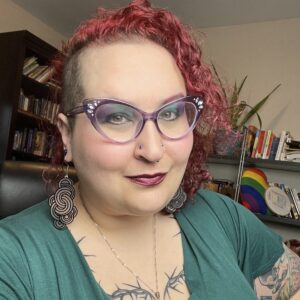Conference 2023 > Keynote speakers > Shanna K. Kattari

Mind the Gap and Fill the Holes: Sexual Pleasure, Diverse Identities, and the Future of Sexuality and Social Work
Shanna K. Kattari (they/them), PhD, MEd, CSE, ACS
Abstract
In the field of social work, sex and sexuality are often considered dirty words, with many social work researchers and practitioners having been told that sexuality and sexual pleasure does not belong within our field. Yet, this is far from the truth; everyone (including ace spectrum individuals) has a sexuality, so how is it possible for us to not acknowledge this important facet of our clients and research participants?
For some time, research and practice around “sexuality” in socal work has become synonymous with either negative experiences (i.e., intimate partner violence, sexual assault, “high risk” behaviors regarding HIV/STIs), or the experiences of LGBTQIA2S+ people or the interestingly termed ”sexual and gender minorities.” Studies on sexuality outside of these socially and field approved topics are often vetoed, rejected from journals and conferences, and otherwise sanitized so as not to sully the field with discussions of sexuality that are more fluid, complex, raw, and even dirty.
In this call to action, Dr. Kattari will speak to the many aspects of sexuality that must be considered a part of our field in order to support our clients, our participants, and even ourselves as whole individuals, using social work values of person-in-environment and self determination. From sexual pleasure to exploring sexual identities, from kink and non-monogamy to intersections of sexuality and disability, and sexuality and race, the time has come for us to take up more space in the field, and to fill the gaps left surrounding sexuality as it relates to social work. We must take pride and ownership in our sexuality work, and lead the charge to shift the tide within our field. From quantitative research on sexual pleasure/comfort as part of bio-psycho-social assessments to qualitative inquiry as to the role of identities in sexual exploration, and arts based methods engaging what have been seen as “fringe” sexualities, the time for us is now. Let us “come” together and find pleasure in our sexuality research and praxis.
Bio
Shanna K. Kattari, PhD, MEd, CSE, ACS is an associate professor at the University of Michigan School of Social Work, in the Women’s and Gender Studies Department (by courtesy) and is the director of the [Sexuality | Relationships | Gender] Research Collective. A white, Jewish, nonbinary, disabled, chronically ill, neurodivergent, polyamorous, queer fat Femme, their practice and community background is as a board-certified sexologist, certified sexuality educator, and social justice activist. Dr. Kattari’s research focuses on three areas that often overlap; disability & ableism, sexuality & sexual health, and queer & trans affirming practice. Their work aims to understand how power, privilege, and oppression systematically marginalize, exclude, and discriminate against people regarding their identities, while also uplifting the brilliance and resistance demonstrated by these communities in the face of stigma and harm. Recently, Kattari’s work has focused on the health disparities among trans/nonbinary communities, across physical, behavioral, and sexual health, using community-based participatory research and arts based methods. Their work has also included several studies on disability and ableism, particularly regarding the Academy, and social work education.
Dr. Kattari also explores experiences of sexuality in marginalized communities, most notably disabled adults, LGBTQIA2S+ individuals, those practicing non-monogamy, and those practicing kink/Leather/BDSM. Their work with the SRG Collective allows them collaborators across North America, England, and Aotearoa/New Zealand, and they deeply value having many students and community members as collaborators. They strongly believe in translational research which benefits the communities being researched, and values making research accessible to not only academics but also to society at large. They are committed to engaging, innovative education and critical pedagogy, multi-level omnidirectional mentorship models, and supporting individuals from a variety of identities in entering, navigating and succeeding in the academy. Their edited collection “Social Work and Health Care Practice with Transgender and Nonbinary Individuals and Communities” recently won the SSWR Book Award Honorable Mention, and their new edited collection “Exploring Sexuality and Disability: A Guide for Human Service Professionals” is forthcoming in late 2023.
